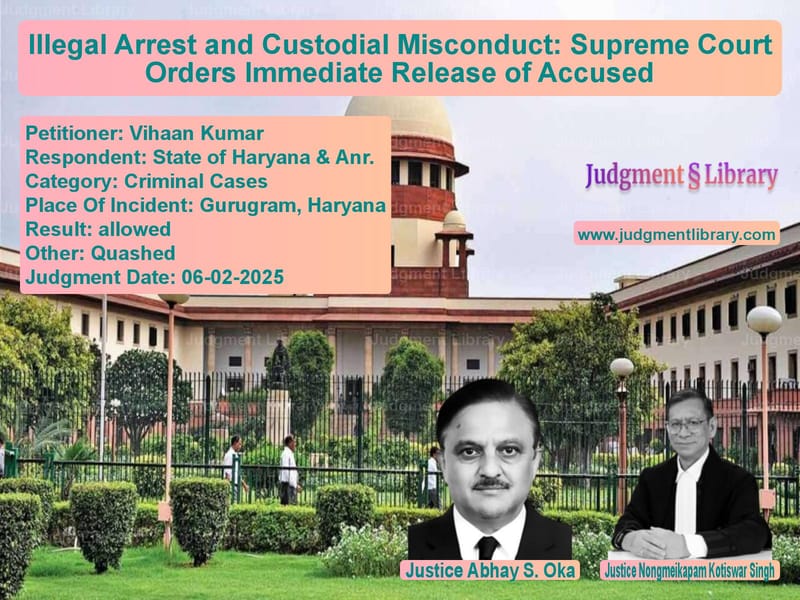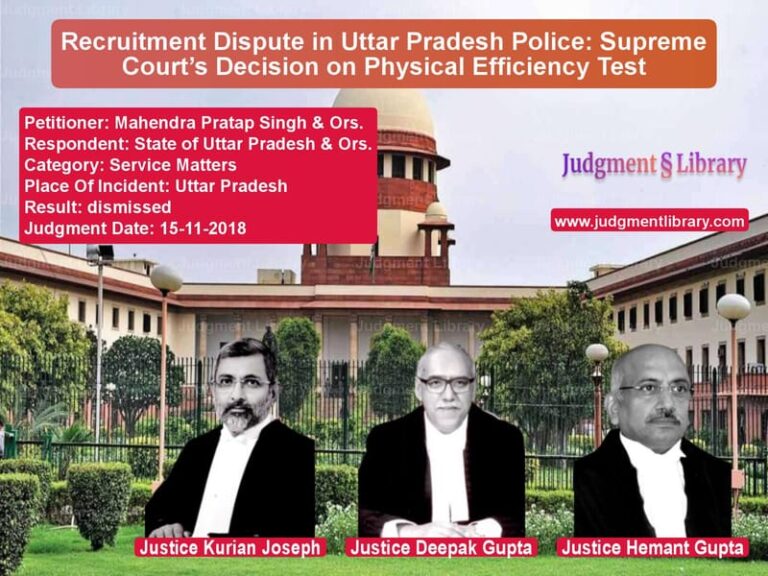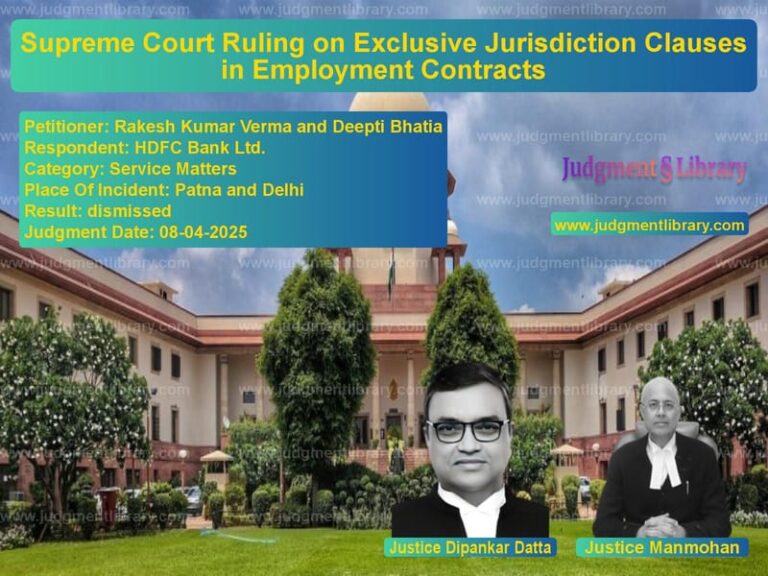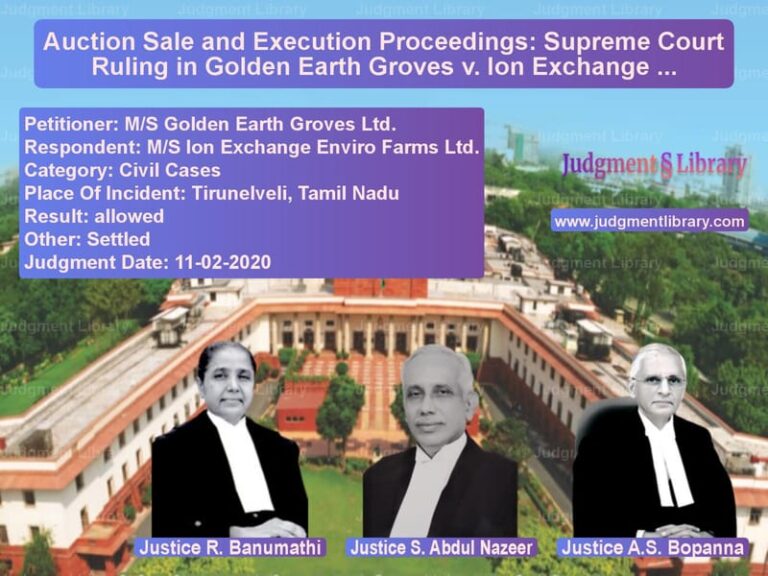Illegal Arrest and Custodial Misconduct: Supreme Court Orders Immediate Release of Accused
The case of Vihaan Kumar vs. State of Haryana & Anr. is a landmark judgment where the Supreme Court ruled that the accused was illegally arrested in violation of Article 22(1) of the Indian Constitution. The Court found that the police failed to inform the accused of the grounds of his arrest and subsequently subjected him to inhumane treatment while in custody.
The appellant, Vihaan Kumar, was arrested in connection with a case registered under Sections 409, 420, 467, 468, and 471 read with Section 120-B of the Indian Penal Code (IPC). The Supreme Court held that the arrest was unconstitutional and directed the immediate release of the accused.
Background of the Case
The appellant was arrested on June 10, 2024, in Gurugram, Haryana, in connection with FIR No. 121 of 2023. The arrest was made in relation to allegations of financial fraud. The appellant was taken to the DLF Police Station, Sector 29, Gurugram, and was later produced before a Judicial Magistrate.
However, the appellant contended that:
- He was not informed of the grounds of his arrest, violating his rights under Article 22(1) of the Constitution.
- He was not presented before a magistrate within 24 hours of his arrest, violating Article 22(2).
- While in custody, he was subjected to inhumane treatment, including being handcuffed and chained to a hospital bed at PGIMS, Rohtak.
These issues were brought before the Supreme Court for consideration.
Arguments Before the Supreme Court
Appellant’s (Vihaan Kumar’s) Arguments
The appellant’s senior counsel, Kapil Sibal, argued that:
- The arrest was illegal as the police did not inform the accused of the grounds of arrest.
- The accused was not produced before a magistrate within the mandated 24-hour period.
- The accused was subjected to degrading treatment while in custody, violating his fundamental rights under Article 21.
- The authorities had filed contradictory statements regarding the time and circumstances of the arrest.
- The accused should be immediately released, and the arrest should be declared illegal.
Respondent’s (State of Haryana) Arguments
The State of Haryana, represented by Senior Counsel Basant R., countered that:
- The accused was informed of the grounds of arrest at the time of his detention.
- The time of arrest recorded in official documents confirmed compliance with legal requirements.
- The accused’s wife was informed of the arrest and its reasons.
- The accused was presented before a magistrate within 24 hours.
- The allegations regarding handcuffing and chaining were an operational lapse, and the responsible officers had been suspended.
Supreme Court’s Observations and Ruling
The Supreme Court found that the police had violated the accused’s fundamental rights, stating:
“No person who is arrested shall be detained in custody without being informed, as soon as may be, of the grounds for such arrest.”
The Court noted that:
- The arrest memo did not explicitly mention the grounds of arrest.
- The police admitted that the accused’s wife was informed, but this did not fulfill the constitutional mandate.
- There was no evidence that the accused was told why he was being arrested.
- The accused was kept in police custody in a manner that violated his dignity and human rights.
Violation of Article 22(1)
The Supreme Court held that Article 22(1) mandates that an arrested individual must be informed of the reasons for the arrest without delay. The Court emphasized:
“The fundamental right of an individual to know the reason for his arrest cannot be delegated to a third party, including a family member. This right is personal and direct.”
Illegal Detention and Mistreatment
The Court condemned the treatment of the accused while in custody. It was found that:
- The accused was handcuffed and chained to a hospital bed while undergoing medical treatment.
- The police admitted to this act and took disciplinary action against the involved officers.
- The act of chaining the accused to a hospital bed violated human dignity and was unconstitutional.
Final Judgment
The Supreme Court ruled:
“The arrest of the appellant is vitiated due to non-compliance with Article 22(1) of the Constitution. The accused shall be released forthwith, and his continued detention is illegal.”
The Court issued the following orders:
- The appellant shall be immediately released.
- The finding of illegal arrest shall not impact the ongoing criminal trial, which will proceed as per the law.
- The State of Haryana must issue guidelines to prevent similar illegal arrests and custodial misconduct in the future.
- A copy of the judgment shall be sent to the Home Secretary of Haryana for compliance.
Key Takeaways
- Right to Be Informed: Arrested individuals must be explicitly told why they are being detained.
- Illegal Detention Voids Arrest: If an arrest does not comply with Article 22(1), it is rendered void.
- Custodial Misconduct Condemned: The Court strongly disapproved of the accused being chained to a hospital bed.
- Remedial Measures Ordered: The State must take corrective action to ensure proper handling of future arrests.
Conclusion
The Supreme Court’s ruling in this case serves as a strong warning against arbitrary arrests and custodial mistreatment. The decision reaffirms the fundamental rights of individuals and ensures that constitutional protections are strictly upheld.
Petitioner Name: Vihaan Kumar.Respondent Name: State of Haryana & Anr..Judgment By: Justice Abhay S. Oka, Justice Nongmeikapam Kotiswar Singh.Place Of Incident: Gurugram, Haryana.Judgment Date: 06-02-2025.
Don’t miss out on the full details! Download the complete judgment in PDF format below and gain valuable insights instantly!
Download Judgment: vihaan-kumar-vs-state-of-haryana-&-a-supreme-court-of-india-judgment-dated-06-02-2025.pdf
Directly Download Judgment: Directly download this Judgment
See all petitions in Bail and Anticipatory Bail
See all petitions in Legal Malpractice
See all petitions in Custodial Deaths and Police Misconduct
See all petitions in Judgment by Abhay S. Oka
See all petitions in Judgment by N. Kotiswar Singh
See all petitions in allowed
See all petitions in Quashed
See all petitions in supreme court of India judgments February 2025
See all petitions in 2025 judgments
See all posts in Criminal Cases Category
See all allowed petitions in Criminal Cases Category
See all Dismissed petitions in Criminal Cases Category
See all partially allowed petitions in Criminal Cases Category







